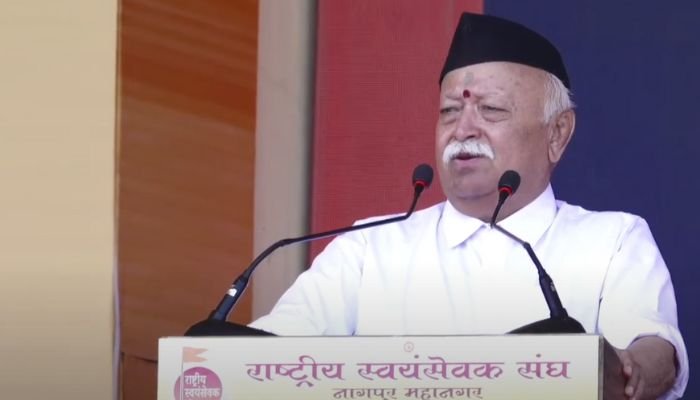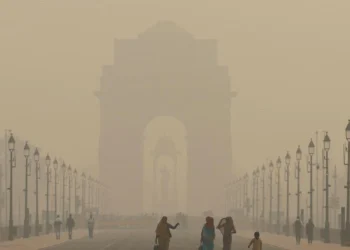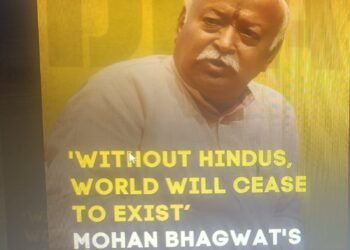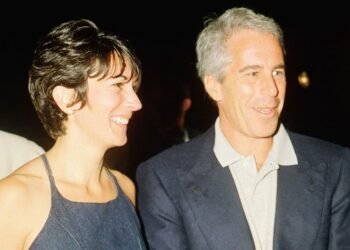RSS Chief Mohan Bhagwat hailed India’s armed forces and Modi’s resolve, calling Operation Sindoor a “fitting response” to Pakistan-backed terror.
BY PC Bureau
October 2, 2025 – Ina rare gesture, Rashtriya Swayamsevak Sangh (RSS) Sarsanghchalak Mohan Bhagwat publicly commended Prime Minister Narendra Modi’s leadership during his annual Vijayadashami address at the RSS headquarters on Thursday.
Speaking on the occasion of the organization’s centenary celebrations, Bhagwat hailed the “firmness of the country’s leadership” and the “valour and war-readiness of our armed forces” in the context of Operation Sindoor—India’s decisive counter-terrorism strike against Pakistan earlier this year.
The endorsement marked a rare departure from Bhagwat’s typically measured tone toward the Bharatiya Janata Party (BJP)-led government, coming after frequent tributes from Modi to the RSS chief.
The event at Reshimbagh grounds, attended by thousands of swayamsevaks, former President Ram Nath Kovind, Union Minister Nitin Gadkari, and Maharashtra Chief Minister Devendra Fadnavis, underscored the Sangh’s enduring influence. After performing the traditional Shastra Puja to honor weapons symbolizing national defense, Bhagwat delivered a 45-minute speech that blended global diplomacy, societal introspection, and a firm affirmation of India’s security posture.
READ: At 100, RSS Chief Warns Against “Grammar of Anarchy,” Urges Discipline & Dialogue
Operation Sindoor: A Testament to Resolve and Restraint
At the heart of Bhagwat’s remarks was Operation Sindoor—the precision strikes launched in May 2025 following the Pahalgam terror attack on April 22, where 26 civilians, mostly pilgrims, were killed by Pakistan-backed militants.
Describing the operation as a “fitting response” that revealed “India’s true friends” on the global stage, Bhagwat praised both the armed forces and political leadership. “Our leadership’s resolve shone through, backed by the bravery of our soldiers and the unity of our society,” he said, in a line widely interpreted as a nod to Modi’s stewardship.
‘ऑपरेशन सिंदूर के बाद विभिन्न देशों द्वारा निभाई गई भूमिका ने हमारे सच्चे मित्रों को उजागर किया. देश के भीतर भी, ऐसे असंवैधानिक तत्व हैं जो देश को अस्थिर करने का प्रयास करते हैं.’, विजयादशमी उत्सव में RSS प्रमुख मोहन भागवत ने कहा#RSS #Nagpur #Vijayadashami | #ZeeNews pic.twitter.com/Ib5jcra4LE
— Zee News (@ZeeNews) October 2, 2025
Defence Minister Rajnath Singh echoed this sentiment at a parallel Dussehra event in Bhuj, declaring that Operation Sindoor had “met all its goals” and “exposed Pakistan’s air defense vulnerabilities.”
Bhagwat added a cautionary note: “Minor offenses must not spiral into mob violence through provocation; respect for the law is as crucial as our strategic alertness.” The message reinforced the RSS’s emphasis on disciplined nationalism, balancing vigilance with constitutional fidelity.
A Reciprocal Gesture After Modi’s Sustained Adulation
What made the praise significant was its timing and rarity. For months, Modi has openly lauded Bhagwat and the RSS during its centenary year.
On Bhagwat’s 75th birthday in September, Modi penned a glowing article calling him an “extraordinary personality” whose leadership represented the “most transformative period” in Sangh history. In August, he described the RSS as the “world’s biggest NGO,” sparking opposition criticism of “currying favour.”
Earlier, during his first visit to the RSS headquarters as PM since 2014, Modi hailed the Sangh’s century-long service, quoting founder K.B. Hedgewar: “If there is darkness in society, RSS ensures there is light.”
By contrast, Bhagwat’s public endorsements of Modi have been scarce, often framed as broader calls for unity rather than personal acclaim. His June 2025 remark on leaders retiring at 75 sparked speculation about pressure on Modi, who turns 75 this year, though he later clarified it was not a fixed rule.
Thursday’s speech broke that pattern, with social media buzzing over a “mutual admiration pact” signaling a reset in BJP-RSS dynamics.
Beyond Security: Self-Reliance, Unity, and Global Posture
While security dominated headlines, Bhagwat’s address ranged widely. He critiqued U.S. tariff hikes as reminders for Atmanirbhar Bharat, arguing that interdependence must be “by choice, not compulsion.”
On unrest in Bangladesh and Nepal, he cited B.R. Ambedkar’s “grammar of anarchy” to warn against chaos, urging societal discipline and cultural cohesion. He stressed unity across caste lines through inclusive celebrations, reaffirming his vision of a “Hindu Rashtra” as a cultural—not theocratic—ideal.
He also flagged Himalayan degradation, demographic imbalances, and migration as emerging challenges, calling for proactive societal reform.
A Centenary Milestone with Political Echoes
As effigies of Ravana blazed, symbolizing good’s triumph over evil, Bhagwat’s speech resonated as both blueprint and warning. Broadcast in 22 Indian and 15 foreign languages, it reached millions worldwide.
For the BJP, it was a morale booster; for the RSS, a reaffirmation of its guiding role. Modi later tweeted praise for the address, lauding the Sangh’s “invaluable contributions to nation-building.”
In an era of global uncertainty, Bhagwat’s words were more than endorsement—they were a signal of alignment, where ideological roots and pragmatic governance converge in a fortified BJP-RSS partnership.













